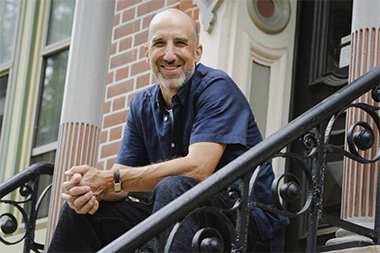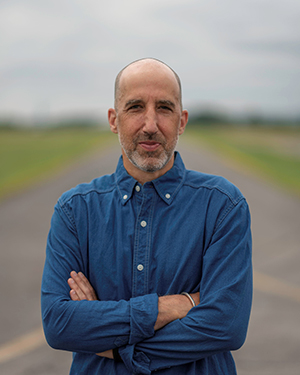In a Novelist’s Hands, the Job of a TSA Worker Comes to Life — with Thrills

For most of us, seeing TSA officers at an airport brings about the fervent hope that our interactions with them will be brief and utterly uncomplicated. See them, get past them, breathe a sigh of relief.
Entering airports after 9/11/01, however, writer and associate professor of English Edward Schwarzschild saw human beings doing new, difficult work. And he wondered about them. He recalled thinking, “Who are those people in the titanium blue uniforms? They must be parents, spouses, sons and daughters, just like, on some level, those of us who don’t wear the uniforms. What is it like for them to work the job and raise a family? What are their hopes and dreams, and do those hopes and dreams resemble my own?”
Trying to answer those questions eventually led Schwarzschild to write a literary thriller, In Security, whose official publication release is next Thursday. It’s been praised by four Pulitzer Prize authors: Richard Russo, Adam Johnson, Gilbert King and William Kennedy.
Schwarzschild, director of creative writing at the University and a fellow of the NYS Writers Institute, chose the most direct route to answering his questions: For two and a half months in late 2012, working the 5 to 9 a.m. shift at Albany International Airport before heading to his University job, he became a Transportation Security Officer (TSO) in training.
What he learned there from the challenging and often exhausting work, combined with “substantial research” that included interviews with security experts at the College of Emergency Preparedness, Homeland Security and Cybersecurity (CEHC), allowed him to round out the character of TSO Gary Waldman. Waldman finds comfort in the rule-bound nature of the job, but his comfort is challenged when he saves a passenger’s life, learns about a possible terrorist cell targeting Albany International, and encounters romance.

In addition, there was something well-established in Schwarzschild’s past fictional works that seemingly had to be brought to Waldman: an exploration of family relationships, particularly those of father and son. Waldman and a young son are haunted by the recent death of their wife and mother.
“I do tend to write about father/son relationships, maybe as a way to understand my own father, maybe as a way to envision the sort of father I’d like to be to my own son, maybe both and more,” said Schwarzschild. “My son is 11 these days. He was three when I took the job at Albany International. That reminds me: This book took a long time to figure out!”
That included what form it would take: fiction or nonfiction. “Ever since the day after 9/11, I’ve been concerned and fascinated by the accelerated growth of the security industry in the U.S,” he said. “I didn’t immediately know how to translate that concern and fascination into my fiction writing.
“I am a writer who sees many things and often thinks ‘book,’ but I am frequently wrong. Sometimes things I think will be books become short stories. Something I thought was a short story became my first novel, Responsible Men (2005). Sometimes things I think will be fiction wind up becoming nonfiction. As I often say to my students, we write to discover what we need to write. Part of the discovery involves learning the best form for that particular story, book, essay, or whatever else it might be.”
Although he knew he would spend only a limited amount of time at Albany International, Schwarzschild took his TSO work seriously and walked away with a great deal of respect for the men and women he briefly worked alongside. “I was genuinely interested in doing the labor, in learning the job. After years of hearing the TSA villainized, after years of carrying into checkpoints my own resentments and anger about the growing reach of our national security system, I wanted to gain a better understanding of what it was like to be on the other side of the checkpoint.
“Much of what I learned about the human aspects of the job and about the kind of people who worked the job went into the book, but, I definitely reached out to colleagues in CEHC to make sure certain elements of the book that I imagined were plausible. Public Service Professor James Steiner was among those who kindly helped me avoid some significant errors in FBI procedure.”
On some level, Schwarzschild’s work on In Security will continue long after the book is published next week. He is now collaborating with Danny Goodwin, associate professor in Art & Art History on a documentary project that explores in words and Goodwin’s photos the past, present and future of the Department of Homeland Security.
“Danny and I are interested in capturing the world of America’s security workers in their own words, through candid interviews, as well as with photographs,” said Schwarzschild. “We’re both extremely fortunate to have the help and support of our colleagues at CEHC on this project.”




